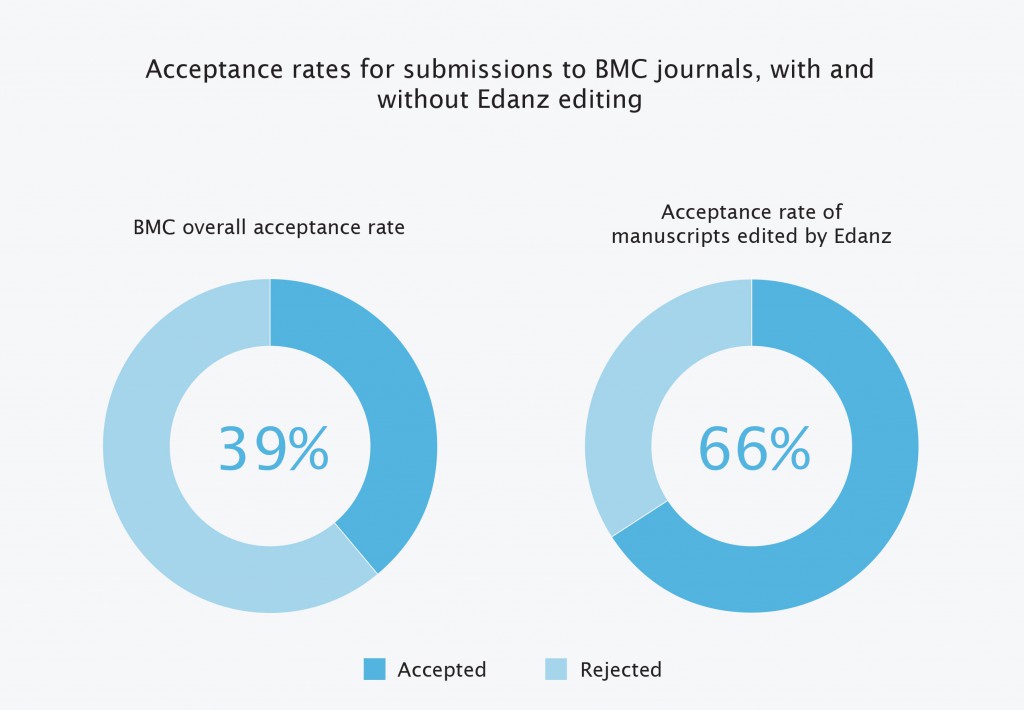
Research in a new white paper we published last week found that using a trusted editing service increased acceptance rates for papers whose authors’ first language wasn’t English. We take a look at some of the challenges these researchers face, and what publishers can do to help.
In academia, competence in writing in English is increasingly regarded as an essential component to visibility and more specifically to getting your research published in international journals.
The challenges faced by English as a Second Language (ESL) researchers in writing for submission to English language journals is well documented, and not insignificant. It isn’t just about writing well – it’s about keeping up with the literature, conducting research in one language and writing up the results in another, finding the right journal, understanding detailed journal and manuscript guidelines, communicating with editors, and interpreting reviewers’ comments.
And if the research is published, there is the added dimension of engaging with readers of the paper (as it is commented on, shared or publicized) and monitoring its impact. This whole range of activity takes researchers out of the comfort zones of their local academic networks and linguistic cultures.
Getting a personal perspective on the challenges
We spoke to one author in China, who is the vice president of a Traditional Chinese Medicine hospital, about his experience (we’ve translated the below from Chinese):
“I had personally put great effort into the studying of English – beyond the standard amount of study, I was meticulous about the grammar, punctuation and use of italics, and had done specialized study in the format of writing abstracts including use of tenses and active/passive voice.
“As a student, I’d already started to translate abstracts of articles for international medical magazines. In spite of that, when it came to writing a medical dissertation in English, the language issue was indeed a major problem for me, as English is not my mother tongue and I had not received structured medical education overseas.
“The main issues I faced were: 1) poor command of the language – not being able to choose suitable words/phrases to precisely express the content and meaning I wanted to get across, difficulty in applying the language as I wished, often having to go over something repeatedly, and yet not feeling confident. 2) stilted sentence construction – often repeating commonly used sentence structure and verbs. 3) use of long-winded expressions, particularly attributes, adverbial clauses and subordinate clauses – sentences are often long and contain superfluous information, but still the meaning is unclear.
“[Also] when an editor uses specialist terminology in his feedback, it can lead to imprecise grasp of the meaning, even misunderstanding. It’s not possible to get the desired result the first time.”
So what can be done to help?
In this context we can see the role of established journals or publishers in reaching out to researchers in regions where English is not the first language, guiding them and providing value-added services to make the experience of getting published less daunting.
For example, we conduct frequent author workshops in China, with the aims of improving the scientific writing skills of Chinese researchers and actively engaging with Chinese authors.
The workshops are free to join and presented by senior editors from BioMed Central who have extensive experience in peer review and editorial decision-making. They provide an overview of publishing in an English language journal, and explain what is involved in getting your article published.
According to Stephanie Harriman, our Medical Editor, who presented a series of workshops in China recently:
“During these workshops, I generally advise authors that if they face difficulties in writing in English, to use a language editing service such as Edanz, whom BioMed Central has a partnership with.
“Even if the author is confident in their English writing skills, it is still really worth getting a native English speaker to read through your manuscript or even just the abstract. I also provide general advice – avoid writing in complicated language (it is much better to explain a complex scientific process in short sentences), and importantly, don’t plagiarize even if it is hard to write in a second language.”
Participants’ feedback from the workshops indicate that they would like more advice on how to write a paper.
BioMed Central and Springer have responded to this demand by providing free online resources on writing and publishing a scientific manuscript. An online guide covers the many things that authors need to think about, ranging from how to choose a journal (including a journal selector tool), to advice on language and how to respond to peer reviews.
To make this information more accessible to non-native English speakers, there are translations in Chinese, Japanese, and Korean. Springer has also developed interactive author training courses, workshop videos and instructional videos (with Chinese and Japanese subtitles) that are free to use. We also make an effort to share these events and resources with ESL audiences via our regional gateways (our Japan Gateway for example) and social media such as Weibo and Twitter.
The benefits and challenges of using editing services
In addition to providing these resources, we recommend trusted language editing services such as Edanz, to authors who wish to have their manuscripts edited by a native-English speaker with scientific expertise.
Anecdotally, we know that many ESL authors struggle to find a good-quality language editing service. In the same interview with the author above, we asked him if he has used a language editing service and whether it helped him. According to him:
“After writing my first draft, I did not have time to go through the whole article, sentence by sentence. I tried to save time by getting a (reputedly not bad) specialist editing service to edit my manuscript. In the end, even I was not satisfied, perhaps because the person who edited my manuscript did not know the field well enough, didn’t understand my aims, or lacked professionalism – there’s no way of knowing.
“The edited manuscript did not make sense, so it was no surprise that my initial submission was not successful. I had to put in a lot of further effort before my manuscript was accepted. Therefore, I do need a language editing service, yet I somehow feel that trustworthy and reliable language editing service providers are in short supply – that’s the crux of the problem.”
Research suggests editing services really can help
For us, we hope that recommending a reliable, high-quality editing service to authors, will indirectly help to raise the quality of manuscripts that are submitted to our journals. This is good for the author, the publisher, the journal editors, the peer reviewers – in theory, all should benefit.
To test this assumption, we set out to analyze a sample of manuscripts on which Edanz had performed language editing and where the target journal was a BioMed Central journal. We found that 66% of the edited manuscripts were accepted for publication, whereas the percentage of manuscripts that were accepted overall in 2013 was 39%. The significance of this was not lost on us – you can read about the analysis and results in this white paper co-authored with Edanz.

These efforts to reduce language barriers to publishing are an important part of engaging with research communities worldwide, and we strongly believe they should be built upon if we are to follow through with our commitment to broaden the reach of open access science publishing in the developing world.
Comments